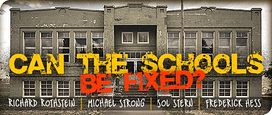Frederick Hess’ latest contribution misunderstands my position in one respect: I would never suggest, and have never suggested, that the social and economic reforms I mentioned should be supported primarily because they would raise student achievement. There are many reasons, for example, to want to ensure that children have adequate health care besides the fact that it would enable them to miss less school because of illness. My only point in this regard is that it is fanciful to think that if only they had better teachers, children will have high rates of success despite poor health including more frequent illness, more frequent iron deficiency anemia, lead poisoning, and asthma; greater family economic stress, including inadequate housing resulting in high rates of mobility, and living in unsafe neighborhoods with high rates of crime and drug abuse. Academic progress is not the only, or even the best reason to fix these things, but if we don’t fix them, expectations that better teachers alone will overcome them make no sense.
Mr. Hess is skeptical that public policy can fix these problems. That is his right, notwithstanding the ability of other industrial democracies to do a somewhat better job in narrowing inequality. But if “the poor shall always be with us,” so too will low test scores and other aspects of disadvantaged students’ inadequate achievement. It is unreasonable and irresponsible to expect schools and teachers to overcome social class differences while exempting every other institution and public official from taking action to do so.
With regard to my claim (and that of Jennifer Rice in her book) that we have made little progress in defining teacher quality, Mr. Hess cites work of Dan Goldhaber, Susanna Loeb, and Tom Kane. What their research has in common is a willingness to use standardized basic skills test scores in reading and (more often, or) math as their sole dependent variable. That we are so willing to entertain the legitimacy of such definitions is one of the tragic legacies of the frenzy stimulated by A Nation at Risk — a frenzy, as I pointed out in my opening essay, that would have horrified Risk’s authors who were terribly concerned about critical thinking skills and other outcomes of education — the “fostering of a common culture,” for example.
Even in their own terms, definitions of teacher quality based on students’ standardized test scores are flawed. Teachers whose students get high test scores (or value added) in math are not necessarily the same as those whose students get high scores in reading. And it is purely speculative to assume that teachers who get high scores in one of these are also teachers who inspire high achievement in history, or science, or citizenship, or inquiry, or democratic habits. I’d say that a teacher is of high quality only if she achieves balanced success in all of these. The research of Goldhaber, Loeb, or Kane cannot help me identify such teachers.
I do note that none of the Cato Unbound respondents, Frederick Hess included, really addressed the question I posed previously. I pointed out that there is now overwhelming evidence that, although there are some wonderful examples of superior charter and private schools flourishing in a deregulated environment, average achievement of charter and private schools does not seem to be substantially better. So I asked:
If we deregulate the teacher market, we will undoubtedly attract some very high quality teachers who might not have made it through the certification hoops. We will also attract some incompetents, who will do serious harm to our children. How many of the latter are we willing to tolerate in order to gain the benefits of the former? Before developing an opinion on Hess’ and Strong’s views, I’d like to hear more about how they propose to address this widely-ignored aspect of choice.
Mr. Hess responds that “sensible deregulation must be coupled with attention to quality control.” To me, ‘quality control’ sounds awfully much like ‘re-regulation.’ This response begs my question. Does Mr. Hess claim that deregulation is not really the answer, but rather that we simply need to substitute a new set of regulations (euphemistically, ‘quality control’) for the old ones?

